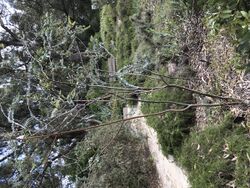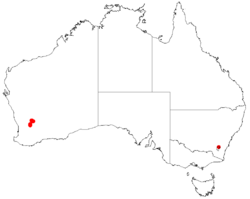Biology:Acacia merrickiae
| Acacia merrickiae | |
|---|---|

| |
| Acacia merrickiae at Kings Park | |
| Scientific classification | |
| Kingdom: | Plantae |
| Clade: | Tracheophytes |
| Clade: | Angiosperms |
| Clade: | Eudicots |
| Clade: | Rosids |
| Order: | Fabales |
| Family: | Fabaceae |
| Subfamily: | Caesalpinioideae |
| Clade: | Mimosoid clade |
| Genus: | Acacia |
| Species: | A. merrickiae
|
| Binomial name | |
| Acacia merrickiae Maiden & Blakely
| |

| |
| Occurrence data from AVH | |
Acacia merrickiae is a shrub belonging to the genus Acacia and the subgenus Phyllodineae that is endemic to a small area of south western Australia .
Description
The open spindly shrub typically grows to a height of 2 to 4 metres (6.6 to 13.1 ft). It has glabrous branchlets that are covered in a fine white powdery which are roughened by scars of fallen phyllodes. Like most species of Acacia it has phyllodes rather than true leaves. The coriaceous grey-green phyllodes have an elliptic to ovate shape that is commonly shallowly concave and reflexed. The phyllodes are 1.5 to 3.5 cm (0.59 to 1.38 in) in length and have a width of 7 to 15 mm (0.28 to 0.59 in) and have a slightly raised midrib and also have a fine white powdery coating.[1] It blooms from April to June and produces yellow-cream flowers.[2] The axillary or terminal inflorescences are found along an raceme axes with a length of 10 to 40 mm (0.39 to 1.57 in) with spherical to obloid shaped flower-heads that have a diameter of 5 to 6 mm (0.20 to 0.24 in) and contain 45 to 65 light golden coloured flowers. Following flowering thinly coriaceous seed pods form that have a linear shape but are constricted between and rounded over each of the seeds. The pods have a length of up to 6 cm (2.4 in) and a width of 5 to 6 mm (0.20 to 0.24 in) and are covered in a fine white powdery coating with longitudinally arranged seeds inside. The dull dark brown seeds have an oblong to elliptic shape with a length of around 4 mm (0.16 in).[1]
Taxonomy
The species was first formally described by the botanists Joseph Maiden and William Blakely in 1928 as part of the work Descriptions of fifty new species and six varieties of western and northern Australian Acacias, and notes on four other species as published in the Journal of the Royal Society of Western Australia. It was reclassified by Leslie Pedley in 2003 as Racosperma merrickiae then transferred back to genus Acacia in 2006.[3] A. merrickiae belongs to the Acacia microbotrya group, resembles Acacia leptopetala and is closely related to Acacia meisneri.[1]
Distribution
It is native to an area in the Wheatbelt region of Western Australia in the IBRA Avon Wheatbelt growing in clay, sandy loam and sandy soils. It has a limitied distribution from around Trayning[2] Kellerberrin and Mukinbudin where it is often part of open woodland communities.[1]
See also
References
- ↑ 1.0 1.1 1.2 1.3 "Acacia merrickiae Maiden & Blakely". Wattle - Acacias of Australia. Lucid Central. https://apps.lucidcentral.org/wattle/text/entities/acacia_merrickiae.htm. Retrieved 9 July 2020.
- ↑ 2.0 2.1 "Acacia merrickiae". FloraBase. Western Australian Government Department of Parks and Wildlife. https://florabase.dpaw.wa.gov.au/browse/profile/3441.
- ↑ "Acacia merrickiae Maiden & Blakely". Atlas of Living Australia. Global Biodiversity Information Facility. https://bie.ala.org.au/species/https://id.biodiversity.org.au/node/apni/2898368#names. Retrieved 9 July 2020.
Wikidata ☰ Q15287816 entry
 |


